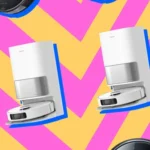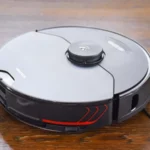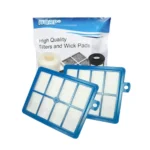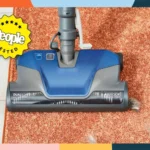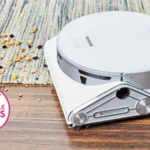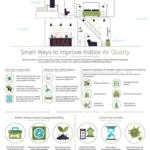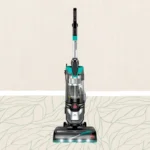Introduction: What Are HEPA Filters and Smart Vacuum Cleaners?
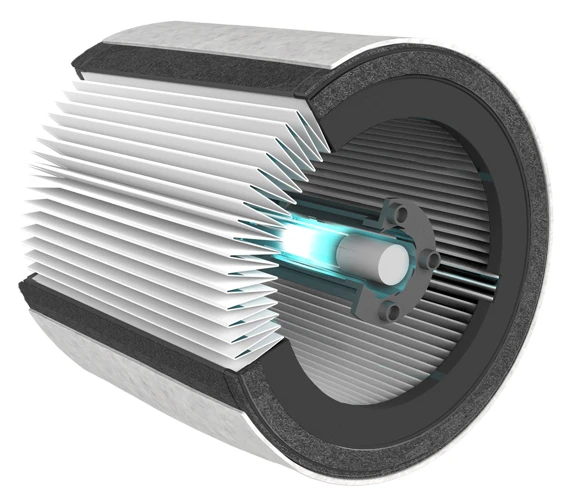
HEPA filters have become an essential part of modern-day vacuum cleaners, especially in smart vacuum cleaners. They help to capture and trap a range of pollutants and allergens, making indoor air cleaner, fresher, and healthier. A HEPA filter, standing for High-Efficiency Particulate Air filter, is a mechanical air filter that works by forcing air through a fine mesh that traps harmful particles like pet dander, pollen, and other airborne particles. The use of HEPA filters in vacuum cleaners has become increasingly important as more and more people become aware of the link between indoor air quality and their health.
Smart vacuum cleaners, on the other hand, are robotic vacuums that are designed to make cleaning easier and more efficient. They use various technologies, such as suction power, brush roll types, and cyclonic technology, to improve their vacuum cleaning ability. They can also be programmed to clean at specific times, and some models can be controlled using a smartphone app or voice commands.
By combining HEPA filters and smart vacuum cleaners, you get a highly efficient cleaning system that not only saves time but also improves the air quality in your home. The HEPA filter ensures that the air released from the vacuum cleaner is free of harmful particles, while the smart technology ensures that every corner of your home is cleaned effectively.
In the next sections of this article, we will discuss how HEPA filters work and the benefits of using them in smart vacuum cleaners. We will also look at the different types of smart vacuum cleaners available and the factors you should consider when choosing one with a HEPA filter. Finally, we will introduce some of the top smart vacuum cleaners with HEPA filters in 2021 and give some tips on how to maintain and replace HEPA filters in your smart vacuum cleaner.
How Do HEPA Filters Work?
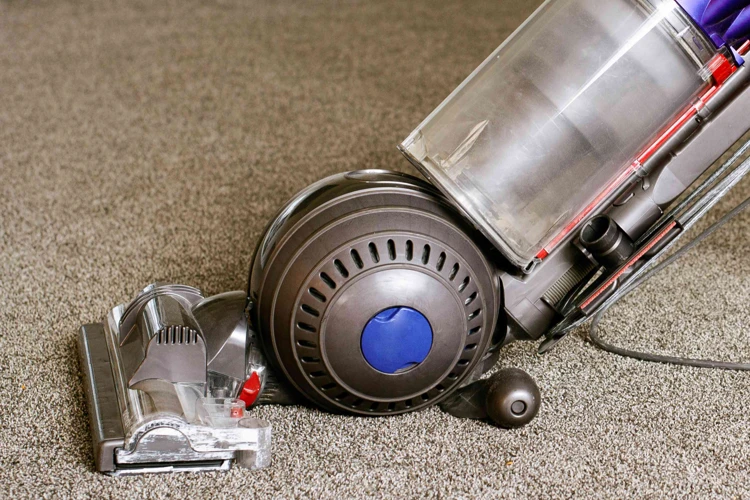
HEPA filters play a vital role in improving indoor air quality and reducing the presence of allergens in the air we breathe. But how do HEPA filters actually work? Well, HEPA stands for High Efficiency Particulate Air, which means that these filters are designed to capture tiny particles that can be harmful to our health – particles that can’t be seen with the naked eye.
HEPA Filter Definition and Air Quality Improvement
HEPA filters are made up of several layers of fine mesh-like material that trap small particles as air flows through them. The layers are densely packed to capture even the tiniest particles, such as pollen, pet dander, dust mites, and other allergens. HEPA filters are highly effective in removing up to 99.97% of contaminants that are 0.3 microns or larger. This makes them especially beneficial for people with asthma or allergies, as well as those who want to improve the air quality in their homes.
How HEPA Filters Capture and Trap Particles
HEPA filters use several mechanisms to capture particles that pass through them. First, larger particles, such as hair or dust, get trapped by the filter’s dense layers of mesh material. Then, as smaller particles pass through the filter, they get trapped in the filter’s fibers through a process called “interception.” Lastly, smaller particles that are not captured through interception get trapped by the filter through “diffusion.” Diffusion happens when small particles collide with gas molecules, causing them to move in a zigzag pattern that leads to them being trapped in the filter.
In smart vacuum cleaners, the HEPA filter plays a crucial role in improving air quality by capturing small particles that are kicked up during the cleaning process. An excellent vacuum cleaner with strong suction power will suck up dust and debris, but without a good filter, those particles will be released back into the air. That’s why HEPA filters in smart vacuum cleaners are so important – they capture these tiny particles, ensuring that they stay out of the air and improving the overall air quality in our homes. By preventing allergens and irritants from circulating in the air, smart vacuums with HEPA filters improve the health and well-being of everyone in the household.
Need more information on factors affecting vacuum cleaning ability? Check out our guide to 5 factors that affect vacuum cleaning ability.
HEPA Filter Definition and Air Quality Improvement
HEPA filters are an essential component of a smart vacuum cleaner that contributes significantly to indoor air quality improvement. HEPA, or High-Efficiency Particulate Air, filter captures 99.97% of airborne pollutants as small as 0.3 microns. More than just removing visible dirt, dust, and pet hair, HEPA filters play a vital role in reducing allergens, bacteria, and viruses in the air. It ensures that the vacuum cleaner’s exhaust air is clean, safe, and healthy for breathing. With its ability to trap even the tiniest particles, HEPA filters are very popular in households with allergy and asthma sufferers. In the next section, we’ll dive deeper into the inner workings of HEPA filters and how they effectively capture and trap harmful particles.
How HEPA Filters Capture and Trap Particles
HEPA filters are designed to capture and trap small particles that can be harmful to your health. These filters are so effective that they can capture particles as small as 0.3 microns with an efficiency of up to 99.97%. To put that into perspective, a human hair is roughly 50-70 microns in diameter. In this section, we’ll look at how HEPA filters work and how they capture and trap particles.
| Step | Description |
|---|---|
| Step 1: | The air is pulled in by the vacuum cleaner through the suction power of the motor, which creates a pressure difference between the inside and the outside of the vacuum. |
| Step 2: | The air then passes through the brush roll, which agitates the surface being cleaned while also pulling up debris. |
| Step 3: | Next, the air enters the cyclonic technology, which separates the larger and heavier particles from the smaller and lighter ones. |
| Step 4: | Finally, the air passes through the HEPA filter, where the smallest and most dangerous particles are captured and trapped, leaving the air that is expelled from the vacuum cleaner much cleaner and safer to breathe. |
HEPA filters work by using a combination of three mechanisms: interception, impaction, and diffusion. Interception occurs when a particle comes into contact with a fiber and is trapped. Impaction happens when a particle is too large to be suspended in the air and is trapped by hitting a fiber. Diffusion occurs when a particle is bombarded by air molecules and changes direction, eventually being trapped by a fiber.
The combination of these three mechanisms makes HEPA filters incredibly effective at capturing and trapping particles. However, it’s important to note that the efficiency of the filter can be affected by the design and quality of the filter itself, as well as the suction power of the vacuum cleaner. It’s important to choose a smart vacuum cleaner with a powerful motor and high-quality HEPA filter to ensure maximum efficiency and effectiveness in improving your indoor air quality.
Suction power is also an important factor to consider when choosing a smart vacuum cleaner, as it directly affects the ability of the vacuum to pick up debris and particles from your floor. Additionally, the brush roll type and cyclonic technology can also improve the cleaning performance of the vacuum cleaner and make it more effective in capturing and trapping particles.
The Importance of HEPA Filters in Smart Vacuum Cleaners
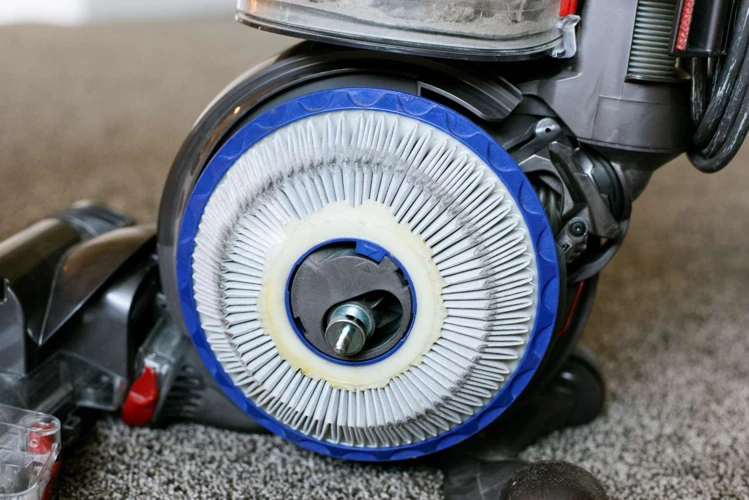
Having a smart vacuum cleaner with HEPA (High-Efficiency Particulate Air) filters can make a significant difference in keeping your indoor air quality healthy and free from pollutants. These filters are crucial components that trap microscopic particles and allergens, including dust mites, pet dander, pollen, and mold spores, from the air while cleaning your floors.
How HEPA Filters Benefit Smart Vacuum Cleaners
HEPA filters provide several benefits to smart vacuum cleaners. Firstly, they help remove up to 99.97% of airborne particles that are as small as 0.3 microns. Secondly, they prevent these particles from being dispersed back into the air during vacuuming, thus reducing the chances of allergy and asthma triggers. Thirdly, HEPA filters help prolong the life of your vacuum cleaner by trapping most of the dust and debris from entering the motor and clogging the filters.
Different Types of Smart Vacuum Cleaners with HEPA Filters
There are various types of smart vacuum cleaners that come equipped with HEPA filters, including robot vacuums, stick vacuums, handheld vacuums, and canister vacuums. Each type of vacuum has its unique features, benefits, and drawbacks. For instance, robot vacuums are ideal for those who want an entirely hands-free cleaning experience, while canister vacuums offer powerful suction and versatile attachments for cleaning different surfaces.
Advantages of Smart Vacuum Cleaners with HEPA Filters
Smart vacuum cleaners with HEPA filters offer several advantages over conventional vacuum cleaners. They help improve indoor air quality and provide allergy relief, effective dust and dirt removal, noise reduction, and smart features such as scheduling and mapping. They are easy to use, require minimal maintenance, and can save you time and effort while keeping your home clean and healthy.
Factors to Consider When Choosing a Smart Vacuum Cleaner with HEPA Filter
When choosing a smart vacuum cleaner with HEPA filters, it’s essential to consider several factors, such as the vacuum cleaner type, features, air filtration and cleaning performance, budget, and maintenance costs. You should also evaluate the suction power, battery life, dustbin capacity, and noise level of the vacuum, as well as the manufacturer’s reputation and customer service.
Top Smart Vacuum Cleaners with HEPA Filters in 2021
Some of the top smart vacuum cleaners with HEPA filters in 2021 include the Roborock S6 MaxV, iRobot Roomba i7+, and Ecovacs Deebot Ozmo T8 AIVI. These vacuums offer high-performance cleaning, advanced navigation and mapping, voice control, and other smart features that make cleaning effortless and efficient.
How to Maintain and Replace HEPA Filters in Smart Vacuum Cleaners
To ensure optimal performance and longevity of your smart vacuum cleaner with HEPA filters, it’s crucial to follow the manufacturer’s maintenance guidelines. This includes cleaning and washing the HEPA filters regularly, replacing them every 6-12 months or as recommended, and keeping the vacuum’s dustbin and brush rolls clean from debris and tangled hair.
Conclusion: Benefits of HEPA Filters in Smart Vacuum Cleaners
HEPA filters play a crucial role in enhancing the air quality in your home and keeping it clean and healthy. By investing in a smart vacuum cleaner with HEPA filters, you can enjoy the benefits of efficient cleaning, allergy relief, noise reduction, smart features, and minimal maintenance, while reducing your exposure to indoor pollutants and respiratory irritants.
How HEPA Filters Benefit Smart Vacuum Cleaners
Smart vacuum cleaners have revolutionized the way we clean our homes. With advanced features such as Wi-Fi connectivity, voice control, and laser navigation, these devices offer superior cleaning performance and convenience. But what makes them even more valuable is the integration of HEPA filters. These filters are designed to capture and eliminate tiny particles that can cause respiratory problems, leading to improved indoor air quality. Let’s dive deeper into how HEPA filters benefit smart vacuum cleaners and make them a must-have for any household.
Different Types of Smart Vacuum Cleaners with HEPA Filters
When it comes to smart vacuum cleaners with HEPA filters, there are several types available, each with its unique features and benefits. Let’s take a closer look at some of the different types of smart vacuum cleaners with HEPA filters.
| Vacuum Cleaner Type | Description | Benefits |
|---|---|---|
| Robot vacuum cleaner | As the name suggests, these are small robotic vacuum cleaners that are programmable and can navigate through your home on their own. Some models even come with app control, voice control, and mapping features. | Convenient, hands-free cleaning; can be scheduled to clean when you’re not home; some models have advanced features like mapping and voice control. |
| Handheld vacuum cleaner | These are small, lightweight vacuum cleaners that are perfect for spot cleaning and quick pickups. They’re great for cleaning upholstery, stairs, and tight spaces. | Easy to use and maneuver; portable and compact; great for quick cleanups. |
| Stick vacuum cleaner | A stick vacuum cleaner is a lightweight, cordless vacuum cleaner that is perfect for everyday cleaning. They’re great for hard floors and low-pile carpets. | Lightweight and easy to maneuver; cordless for added convenience; great for daily cleaning. |
No matter which type of smart vacuum cleaner you choose, make sure it comes with a HEPA filter to ensure that it effectively captures and removes airborne particles and allergens from your indoor environment.
Advantages of Smart Vacuum Cleaners with HEPA Filters
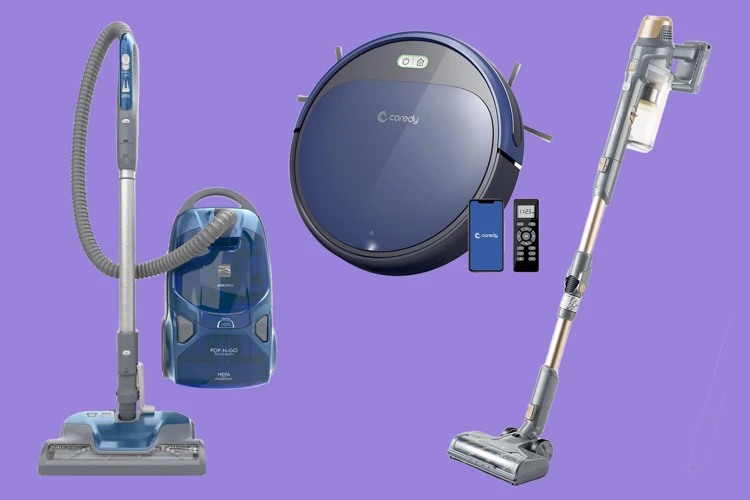
Smart vacuum cleaners are becoming increasingly popular among homeowners due to their advanced features and ability to make cleaning easier and more efficient. When it comes to maintaining a clean and healthy home environment, the importance of HEPA filters in smart vacuum cleaners cannot be overstated. These filters are designed to capture and trap small particles, allergens, and bacteria, which makes them a vital component of any smart vacuum cleaner.
Let’s take a closer look at the advantages of smart vacuum cleaners with HEPA filters:
Improved Indoor Air Quality and Allergy Relief
HEPA filters can trap particles as small as 0.3 microns, including dust, pollen, pet dander, and mold spores. By capturing these particles, HEPA filters help improve indoor air quality and reduce the risk of allergies and respiratory problems. Smart vacuum cleaners with HEPA filters are especially beneficial for people with allergies or asthma, as they can help reduce exposure to allergens and other airborne irritants.
Effective Dust and Dirt Removal
Smart vacuum cleaners with HEPA filters are highly effective at removing dust and dirt from floors, carpets, and other surfaces. The filters capture even the smallest particles, ensuring that your home stays clean and free of dirt and debris. Smart vacuum cleaners with HEPA filters often come with advanced features like multi-surface brushes and powerful suction that can help remove dirt and debris from hard-to-reach areas.
Noise Reduction and Smart Features
Many smart vacuum cleaners with HEPA filters come with advanced features like noise reduction technology and smart sensors. These features help make cleaning more convenient and less disruptive, allowing you to clean your home without disturbing your family or pets. Smart sensors can also help the vacuum cleaner navigate around obstacles and avoid falling down stairs, making the cleaning process safer and more efficient.
When choosing a smart vacuum cleaner with HEPA filter, there are several factors you should consider. These include the type of vacuum cleaner, cleaning performance, budget, and maintenance costs. It’s also important to regularly clean and replace HEPA filters to ensure optimal performance and effectiveness.
Smart vacuum cleaners with HEPA filters are an excellent investment for anyone looking to maintain a clean and healthy home environment. These vacuum cleaners offer numerous advantages, including improved indoor air quality, effective dust and dirt removal, and advanced features like noise reduction and smart sensors. By choosing the right smart vacuum cleaner with HEPA filter and maintaining it properly, you can enjoy all of these benefits and more for years to come.
Improved Indoor Air Quality and Allergy Relief
Are you tired of constantly sneezing or suffering from allergies in your own home? Look no further than a smart vacuum cleaner with a HEPA filter. Not only do these filters improve your indoor air quality, but they also provide allergy relief. HEPA filters are particularly effective in capturing and trapping even the smallest allergens, such as pollen, pet dander, and dust mites. Keep reading to learn how a smart vacuum cleaner with a HEPA filter can make a significant difference in your home’s air quality and, subsequently, your overall health and well-being.
Effective Dust and Dirt Removal
Smart vacuum cleaners with HEPA filters offer effective dust and dirt removal, which is one of their most significant advantages. The HEPA filter technology allows the vacuum cleaner to trap and remove finer particles that traditional vacuum cleaners can miss, resulting in a cleaner and healthier living space.
What makes HEPA filters so effective in removing dust and dirt particles is their ability to capture particles as small as 0.3 microns with an efficiency of up to 99.97%. To put that in perspective, a human hair strand measures around 100 microns in diameter, which means that HEPA filters can capture particles that are 300 times smaller than a human hair.
To emphasize the effectiveness of HEPA filters in smart vacuum cleaners, let’s take a look at a comparison table between a traditional vacuum cleaner and a smart vacuum cleaner with a HEPA filter.
| Traditional Vacuum Cleaner | Smart Vacuum Cleaner with HEPA Filter | |
|---|---|---|
| Dust and Dirt Removal Efficiency | Can capture large particles (over 10 microns) effectively | Can capture particles as small as 0.3 microns with up to 99.97% efficiency |
| Allergen Removal Efficiency | May not effectively capture allergens such as pet dander, dust mites, and pollen | Can capture allergens with HEPA filter technology, providing relief for allergy sufferers |
| Cleaning Performance | May miss finer particles, resulting in less thorough cleaning | Provides thorough and efficient cleaning, leaving no trace of dust or dirt |
| Noise Level | May produce loud noise during operation | Operates quietly and efficiently, providing a peaceful cleaning experience |
As you can see, a traditional vacuum cleaner may not be as effective in removing dust and dirt particles as a smart vacuum cleaner with a HEPA filter. If you live in a dusty or polluted environment or have allergies, investing in a smart vacuum cleaner with a HEPA filter is highly recommended.
Noise Reduction and Smart Features
Smart vacuum cleaners equipped with HEPA filters not only offer better air quality, but they also come with features that improve user experience, such as noise reduction and a range of smart features that make cleaning effortless. Let’s take a closer look at these features in the table below:
| Feature | Description |
|---|---|
| Noise Reduction | HEPA filters can help reduce noise levels by capturing fine dust particles and reducing the amount of debris that hits the motor. Some smart vacuum cleaners also include noise-dampening features, such as rubber wheels, that help reduce noise even further. |
| Smart Navigation | Many smart vacuum cleaners come with advanced navigation systems that allow them to easily navigate around furniture and obstacles. This not only saves time, but it also reduces the amount of noise the vacuum makes when bumping into objects. |
| App Control | Smart vacuum cleaners often come with an accompanying app that allows you to control the device remotely. This means you can start and stop cleaning sessions without ever having to get up from your seat. Some apps also allow you to schedule cleaning sessions or even create custom cleaning maps. |
| Voice Control | Many smart vacuum cleaners come with voice control capabilities, allowing you to control the device using your voice. This means you can start, stop, and schedule cleaning sessions using voice commands. Some models are even compatible with popular voice assistants like Amazon Alexa or Google Assistant. |
| Automatic Charging | Smart vacuum cleaners with HEPA filters often come with an automatic charging feature that allows the device to return to its charging dock when the battery is running low. This not only ensures that the device is always ready for the next cleaning session, but it also reduces noise levels by eliminating the need to manually charge the device. |
The various noise reduction and smart features of smart vacuum cleaners with HEPA filters make them a valuable addition to any household. Whether you’re looking to reduce noise levels, control your device remotely, or improve air quality, a smart vacuum cleaner with a HEPA filter is a great investment for any homeowner.
Factors to Consider When Choosing a Smart Vacuum Cleaner with HEPA Filter
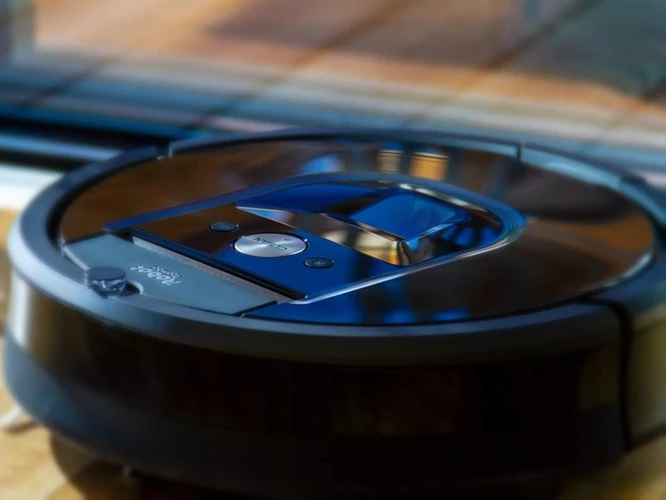
When it comes to choosing a smart vacuum cleaner with HEPA filter, there are several important factors that you should consider before making a purchase. By taking these factors into account, you can ensure that you invest in a vacuum cleaner that meets your needs and provides optimal performance.
Vacuum Cleaner Type and Features: The first factor to consider is the type of vacuum cleaner and its features. There are different types of smart vacuum cleaners available, such as robot vacuums, stick vacuums, and handheld vacuums. Each type has its own unique features and benefits. For example, robot vacuums are ideal for those who want hands-free cleaning, while stick vacuums are great for quick, easy cleaning of floors and carpets. Consider the type of cleaning you need to do and the features you want in a vacuum cleaner, such as suction power, battery life, and compatibility with a companion app.
Air Filtration and Cleaning Performance: Another important factor to consider is the air filtration and cleaning performance of the vacuum cleaner. Look for a vacuum cleaner with HEPA filter technology that can capture even the smallest particles up to 0.3 microns. Choose vacuum cleaners that have a high suction power and multiple cleaning modes for thorough cleaning of carpets, hard floors, and crevices.
Budget and Maintenance Costs: It’s also important to consider your budget and the maintenance costs associated with the vacuum cleaner. While smart vacuum cleaners with HEPA filter technology may be more expensive upfront, investing in a high-quality vacuum cleaner can save you money in the long run by reducing the need for frequent replacements and costly repairs. Look for a vacuum cleaner with a warranty and easy-to-replace parts. Additionally, consider the cost of replacing the HEPA filter and any other maintenance costs associated with the vacuum cleaner.
Finding the right smart vacuum cleaner with HEPA filter technology requires careful consideration of the vacuum cleaner type, its features, air filtration and cleaning performance, budget and maintenance costs. By taking the time to compare different vacuum cleaners and their features, you can find a vacuum cleaner that suits your cleaning needs and budget while providing optimal performance and improved indoor air quality.
Vacuum Cleaner Type and Features
When it comes to choosing a smart vacuum cleaner with a HEPA filter, you need to consider various factors that affect its cleaning performance and functionality. One of the most important factors is the type and features of the vacuum cleaner. Not all smart vacuum cleaners are created equal, and each one has its advantages and limitations. It’s essential to understand the different types of vacuum cleaners and features that best suit your cleaning needs and preferences. Let’s dive deeper into this topic to help you make an informed decision.
Air Filtration and Cleaning Performance
When it comes to choosing a smart vacuum cleaner with a HEPA filter, the air filtration and cleaning performance should be one of the most crucial factors to consider. A high-quality HEPA filter can effectively capture up to 99.97% of particles as small as 0.3 microns, including dust, pet dander, allergens, and even bacteria and viruses.
To assess the air filtration performance of different smart vacuum cleaners with HEPA filters, you can look at the specifications or test results of their CADR (Clean Air Delivery Rate) and ACH (Air Changes per Hour). CADR measures the rate at which a vacuum cleaner can purify the air in a given size of room, while ACH indicates how many times the air in a particular room can be completely cleaned and replaced by the vacuum in an hour.
You can refer to the following table to compare the air filtration and cleaning performance of some popular smart vacuum cleaners with HEPA filters.
| Smart Vacuum Cleaner | CADR | ACH |
|---|---|---|
| Roborock S6 MaxV | 450 m³/h | 4 |
| iRobot Roomba i7+ | 222 m³/h | 2 |
| Ecovacs Deebot Ozmo T8 AIVI | 480 m³/h | 6 |
As you can see, the Roborock S6 MaxV has the highest CADR and can achieve 4 ACH, making it a great choice for a larger room. The Ecovacs Deebot Ozmo T8 AIVI has the highest CADR and can achieve 6 ACH, and it can also use AI (Artificial Intelligence) technology to detect the level of dirt and adjust the suction power accordingly, making it more efficient in cleaning.
In addition to CADR and ACH, other factors that can affect the air filtration and cleaning performance of smart vacuum cleaners with HEPA filters include the size and design of the filter, the suction power and brush technologies, and the quality of the seals and dustbin capacity. It is essential to choose a smart vacuum cleaner that can balance these factors based on your specific needs and preferences.
Budget and Maintenance Costs
When considering a smart vacuum cleaner with a HEPA filter, it’s important to factor in the cost of both the initial purchase and ongoing maintenance. Here are a few things to keep in mind when evaluating the budget and maintenance costs of these vacuums:
- The initial cost: Smart vacuum cleaners with HEPA filters tend to be more expensive than traditional vacuum cleaners. However, the added cost is justified given the superior cleaning performance and air filtration that these vacuums can provide.
- Filter replacement frequency: HEPA filters need to be replaced regularly to maintain their effectiveness. Depending on how frequently you use your vacuum, you may need to replace the filter every six months or so. Make sure to factor in the cost of replacement filters when evaluating the long-term maintenance costs of a smart vacuum cleaner.
- Filter cleaning: Some smart vacuum cleaners allow you to clean the HEPA filter instead of replacing it. This can save you money in the long run, but you’ll need to factor in the time and effort required to clean the filter yourself.
- Additional features: Some smart vacuum cleaners come with additional features that can add to the upfront cost, but can ultimately help you save money in the long run. For example, some models have larger dustbins, which means you won’t need to empty them as frequently. Others have longer battery life, which means you won’t need to replace the battery as often.
- Brand reputation: It can be tempting to opt for a cheaper smart vacuum cleaner, but it’s important to consider the reputation of the brand. Cheaper models may not be as durable and could end up costing you more in the long run if you need to replace them more frequently.
Considering these factors will help you make a more informed decision when it comes to choosing a smart vacuum cleaner with a HEPA filter. While the initial cost may be higher than a traditional vacuum, the long-term benefits of improved air quality and more effective cleaning make it a worthwhile investment for any home or office.
Top Smart Vacuum Cleaners with HEPA Filters in 2021
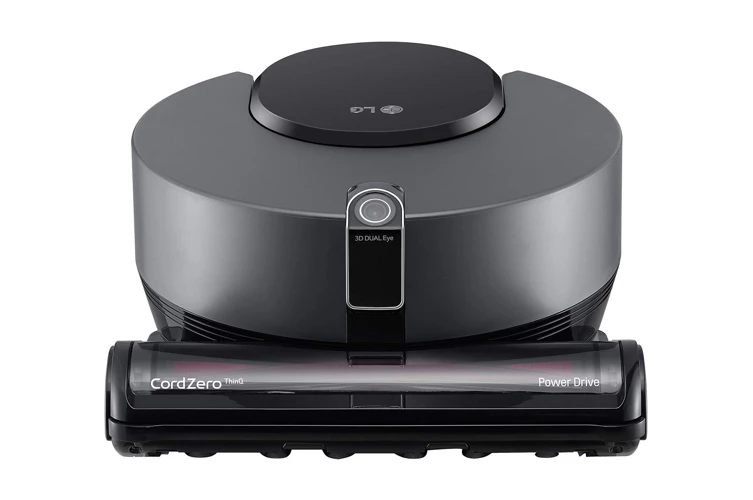
We have compiled a list of some of the best smart vacuum cleaners with HEPA filters available in the market as of 2021:
1. Roborock S6 MaxV: This smart vacuum cleaner is at the top of the list for its advanced features and cleaning performance. The Roborock S6 MaxV uses a high-precision LiDAR navigation system and advanced object recognition technology to effectively map and clean your home. The HEPA filter ensures that your indoor air quality is significantly improved by capturing 99.97% of allergens and dust as small as 0.3 microns.
2. iRobot Roomba i7+: This robot vacuum cleaner is equipped with a powerful suction system and advanced mapping technology that helps it to clean large areas effectively. The iRobot Roomba i7+ uses a HEPA filter that captures mold, pollen, pet dander, and dust mites to ensure that the air in your home is clean and healthy. It also comes with automatic dirt disposal, making it hassle-free to use.
3. Ecovacs Deebot Ozmo T8 AIVI: This smart vacuum cleaner features artificial intelligence and vision technology that enables it to navigate through your home with precision. It comes with a high-efficiency HEPA filter that captures and traps dust, pollen, and allergens, ensuring that the air in your home is free of harmful particles. The Ecovacs Deebot Ozmo T8 AIVI also has a mopping feature that cleans floors with ease.
These smart vacuum cleaners with HEPA filters are some of the best in the market. They are all equipped with advanced features that make cleaning your home effortless and ensure that your indoor air quality is significantly improved. However, it is important to consider the type of vacuum cleaner that suits your needs and budget when making a purchase.
Roborock S6 MaxV
Imagine having a vacuum cleaner that not only cleans your floors but can also see and avoid obstacles in its way. The Roborock S6 MaxV is one such advanced smart vacuum cleaner that combines powerful performance with technological innovation. With its precision LiDAR navigation and stereo cameras, this robot vacuum can accurately map out your home and clean every corner, even in low-light conditions. And with its HEPA filtration system, the Roborock S6 MaxV can trap 99.97% of particles as small as 0.3 microns, making it an excellent choice for anyone looking to improve indoor air quality. Let’s dive deeper into the features and benefits of the Roborock S6 MaxV with HEPA filter.
iRobot Roomba i7+
One of the most popular smart vacuum cleaners with HEPA filters is the iRobot Roomba i7+. This advanced robotic vacuum cleaner is designed to provide hassle-free cleaning and advanced air filtration capabilities. Here are some of the key features and benefits of the iRobot Roomba i7+ that make it one of the best options on the market:
- Powerful Performance: The iRobot Roomba i7+ is equipped with a powerful motor and advanced cleaning brushes that can tackle even the toughest dirt and debris. It also has a high-efficiency filter that captures 99% of dust, pollen, pet dander, and other allergens.
- Smart Mapping Technology: The Roomba i7+ uses advanced mapping technology and sensors to create a detailed map of your home, allowing it to clean efficiently without bumping into objects or getting stuck. You can also use the companion app to set custom cleaning schedules or activate the vacuum from anywhere.
- Automated Dirt Disposal: One of the unique features of the Roomba i7+ is the Clean Base Automatic Dirt Disposal system. When the vacuum is finished cleaning, it returns to the base station and empties its dustbin into a disposable bag, so you don’t have to worry about touching or emptying it manually.
- Multi-Surface Cleaning: The Roomba i7+ is capable of cleaning multiple surfaces, including carpets, hardwood floors, and tile. It also has advanced sensors that can detect when it transitions between surfaces, allowing it to adjust its cleaning power automatically.
- Voice Control: The Roomba i7+ is compatible with Amazon Alexa and Google Assistant, so you can use voice commands to start or stop the vacuum, schedule cleanings, or check the battery status.
The iRobot Roomba i7+ is a top-of-the-line smart vacuum cleaner that prioritizes both cleaning performance and air quality. With its advanced features and HEPA filtration system, it provides an efficient and thorough cleaning experience that can make your home cleaner and healthier.
Ecovacs Deebot Ozmo T8 AIVI
The Ecovacs Deebot Ozmo T8 AIVI is a high-end smart vacuum cleaner that comes with an advanced HEPA filter system. This model is particularly popular among pet owners and those with allergies due to its exceptional cleaning performance and air filtration capabilities.
Features:
- The Ecovacs Deebot Ozmo T8 AIVI comes equipped with a powerful motor that delivers up to 3000 Pa of suction power, making it one of the most efficient smart vacuums on the market.
- In addition to its suction power, the T8 AIVI also features a mopping function, which allows it to clean and mop floors simultaneously, saving you time and effort.
- The T8 AIVI is equipped with a TrueMapping laser navigation system, which scans your home and creates a detailed map to ensure efficient cleaning and navigation.
- This model also includes state-of-the-art obstacle detection and avoidance sensors, which help the vacuum avoid furniture and other obstacles without getting stuck.
- The Ecovacs Deebot Ozmo T8 AIVI can be controlled through the Ecovacs Home app, allowing you to schedule cleaning sessions, customize cleaning modes, and even control the vacuum using voice commands.
HEPA Filter System:
The T8 AIVI features a multi-stage HEPA filter system that captures up to 99.97% of dust, allergens, and pet hair. The filter system includes:
| Filter Stage | Description |
|---|---|
| Pre-Filter | Traps large particles of dust and debris. |
| High-Efficiency Filter | Captures smaller particles of dust, pollen, and pet dander. |
| Activated Carbon Filter | Removes odors and harmful VOCs. |
| HEPA Filter | Captures particles as small as 0.3 microns, including allergens and bacteria. |
The Ecovacs Deebot Ozmo T8 AIVI is an excellent choice for those looking for a powerful, efficient smart vacuum cleaner with advanced HEPA filtration capabilities. Its advanced features and innovative technology make it a top-contender in the smart vacuum cleaner market.
How to Maintain and Replace HEPA Filters in Smart Vacuum Cleaners
HEPA filters are an essential component of smart vacuum cleaners that help improve indoor air quality and remove harmful particles from the air. However, to ensure that they continue to function effectively, regular maintenance and replacement of these filters is necessary.
Cleaning and Washing HEPA Filters
One of the easiest ways to maintain HEPA filters is by regularly cleaning and washing them. Depending on the manufacturer’s recommendations, HEPA filters can be washed with water and mild detergent, or simply vacuumed with a soft brush attachment. It is important to ensure that the filter is fully dry before it is used again to prevent mold or bacteria growth.
Replacing HEPA Filters Regularly
Despite regular cleaning, HEPA filters eventually become clogged with particles and debris, reducing their filtration capacity. Most manufacturers recommend that these filters be replaced every six months to maintain their efficacy. However, the frequency of replacement may vary depending on usage, environmental conditions, and the type of vacuum cleaner.
Replacing HEPA filters is a simple process that can be done by following the manufacturer’s instructions. In most cases, the filter can be easily removed and replaced by snapping it into place. Some smart vacuum cleaners may even have a notification system that alerts the user when it is time to replace the filter.
Tips for Effective Maintenance
To ensure that HEPA filters last longer and work effectively, there are a few additional tips to keep in mind. Firstly, it is crucial to dispose of dirt and debris collected by the vacuum cleaner properly. Emptying the dustbin or canister after every use prevents excess buildup and reduces the strain on the filter.
Secondly, it is important to use genuine replacement filters recommended by the manufacturer. Using low-quality or third-party filters may compromise the effectiveness of the vacuum cleaner and reduce the lifespan of the filter.
Proper maintenance and replacement of HEPA filters in smart vacuum cleaners is essential to ensure that they function effectively and provide clean indoor air quality. By regularly cleaning and replacing these filters, smart vacuum cleaners can continue to provide reliable and efficient cleaning performance.
Cleaning and Washing HEPA Filters
Maintaining proper hygiene of HEPA filters is crucial for their longevity and continued efficient performance. Over time, debris and dust particles accumulate on the surface of the filter, clogging its pores and restricting airflow. This not only reduces the suction power of your smart vacuum cleaner but also decreases the filtration efficacy, releasing harmful pollutants back into the air. It’s essential to clean and wash your HEPA filters on a regular basis to ensure their optimal cleaning and air purifying capacity. In this section, we will discuss the cleaning and washing procedure for HEPA filters utilizing some efficient techniques to help you maintain the overall health of your smart vacuum cleaner.
Replacing HEPA Filters Regularly
Regular replacement of HEPA filters is essential to ensure the smart vacuum cleaner continues to function efficiently and effectively. Over time, HEPA filters become clogged with dirt, dust, and other particles, reducing their ability to capture and trap contaminants from the air. As a result, the vacuum cleaner’s suction power and overall performance are compromised.
To avoid these problems, it is recommended to replace the HEPA filter every six months or as indicated by the manufacturer. This interval may vary depending on the frequency of vacuuming and the indoor air quality. Some smart vacuum cleaners may also have a filter replacement indicator that alerts users when it’s time to replace the filter.
When replacing the HEPA filters, use only genuine replacement filters recommended by the vacuum cleaner manufacturer. Using off-brand filters may affect the vacuum cleaner’s performance and reduce its lifespan.
To replace the HEPA filter, follow these steps:
- Turn off the vacuum cleaner and unplug it from the power source.
- Locate the filter compartment and open it.
- Remove the old filter and discard it properly.
- Insert the new filter according to the manufacturer’s instructions.
- Close the filter compartment securely.
It is also important to clean the vacuum cleaner regularly to maintain its overall efficiency and prolong the lifespan of the HEPA filter. This includes emptying the dustbin, cleaning the brushes, and wiping down the surfaces to remove any dirt or debris. By following these simple maintenance steps, users can ensure their smart vacuum cleaners with HEPA filters continue to deliver optimal performance and clean indoor air.
Conclusion: Benefits of HEPA Filters in Smart Vacuum Cleaners
In conclusion, HEPA filters have become an important feature in smart vacuum cleaners due to their ability to capture and trap microscopic particles, resulting in improved indoor air quality, allergy relief, and effective dust and dirt removal. They offer noise reduction and other smart features that enhance the overall user experience.
When choosing a smart vacuum cleaner with a HEPA filter, factors to consider include the type and features of the vacuum cleaner, air filtration and cleaning performance, as well as budget and maintenance costs. It is important to choose a vacuum cleaner that suits your needs and lifestyle, and to regularly clean and replace the HEPA filter to maximize its lifespan and effectiveness.
In 2021, some of the top smart vacuum cleaners with HEPA filters on the market include the Roborock S6 MaxV, the iRobot Roomba i7+, and the Ecovacs Deebot Ozmo T8 AIVI. These vacuum cleaners offer advanced navigation and mapping features, voice control, and automatic emptying of dustbins, among other things.
Maintaining and replacing the HEPA filter in a smart vacuum cleaner is also important to ensure its optimal performance. HEPA filters should be regularly cleaned and washed, and replaced every few months, depending on usage and manufacturer recommendations.
Investing in a smart vacuum cleaner with a HEPA filter can offer numerous benefits, from improved indoor air quality and allergy relief, to effective dirt and dust removal and user-friendly features. It is important to do your research and choose a vacuum cleaner that fits your needs and lifestyle, and to properly maintain and replace the HEPA filter to maximize its benefits.
Frequently Asked Questions
1. Do all vacuum cleaners have HEPA filters?
No, not all vacuum cleaners come with HEPA filters. It varies depending on the type and brand of the vacuum cleaner.
2. Is it necessary to have a HEPA filter in a vacuum cleaner?
If you want to improve the air quality in your home and have allergy relief, then having a vacuum cleaner with a HEPA filter is highly recommended.
3. How often should you replace HEPA filters?
It is recommended to replace HEPA filters every 6 to 12 months, depending on how often you use your vacuum cleaner and how dirty the filter gets.
4. Can HEPA filters capture pet dander?
Yes, HEPA filters are great at capturing pet dander, which is a common allergen for many people.
5. Are there any downsides to using HEPA filters in vacuum cleaners?
The only downside to using HEPA filters is that they may reduce the suction power of the vacuum cleaner, but most modern vacuum cleaners have been designed to mitigate this issue.
6. Can HEPA filters remove smoke particles from the air?
Yes, HEPA filters can capture smoke particles and improve the air quality in your home, but they will not remove the smell of smoke.
7. How do you know if a vacuum cleaner has a HEPA filter?
You can check the product specifications or packaging of the vacuum cleaner to see if it comes with a HEPA filter. It will usually be stated clearly if the vacuum cleaner has this feature.
8. Are there any additional benefits to using a smart vacuum cleaner with a HEPA filter?
Smart vacuum cleaners with HEPA filters often come with additional features such as scheduling, voice control, and mapping technology, which make cleaning your home more convenient and efficient.
9. Can you wash HEPA filters?
Yes, some HEPA filters can be washed, but it’s important to check the product instructions before attempting to do so. Not all filters are washable and improper cleaning can damage the filter.
10. How much do vacuum cleaners with HEPA filters cost?
The cost of a vacuum cleaner with a HEPA filter can vary greatly depending on the brand, type, and additional features. However, you can find good quality options for as little as $100, while high-end models can cost upwards of $1,000.

